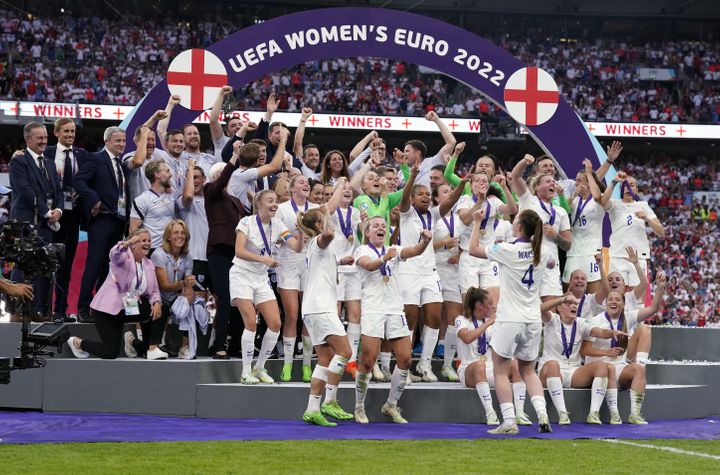It’s been almost a week since England’s gifted women’s national team brought home their first major honour, and the first major honour any England team has won since 1966. Goals from Ella Toone and Chloe Kelly secured the European Championship for England in front of a record-breaking Wembley crowd.
Notably, England’s win marked the second consecutive glory for head coach, Sarina Wiegman, having previously lifted the trophy with her native Netherlands team in 2017. Since gaining her FIFA Pro Coaching Licence in 2016, Weigman has proven herself to be an incredibly effective manager. A win percentage of 72.2% with the Netherlands over 72 games is a record that puts her on a par with successful managers in the men’s game such as Pep Guardiola. Wiegman has yet to taste defeat with England, winning 18 of her 20 matches as manager with only five goals conceded.
Along with her two European Championships, she also guided the Netherlands to the 2019 FIFA Women’s World Cup Final where her team was defeated by the number one ranked team in the world, the United States.
What makes Sarina Wiegman such an effective coach? How was she able to turn around a poorly performing Netherlands team with low morale that had regularly struggled to qualify for major tournaments and often went home early when they did? What is it about her methods that took an England team always falling short of success over the line?
Values
Wiegman’s coaches her sides with a set of firm team-focused values. She expects her players not to focus on their individual goals, but the team’s goals, because success for the team leads to success for the individual.
When you listen to her player’s talk in interviews, note how they rarely talk about themselves. They talk about their teammates; they offer credit and praise for the contribution of others. Wiegman’s philosophy is centred around the death of personal ego, and instead focuses on a sense of shared goals and community building within her teams where everyone plays a role, and everyone needs to pull their weight.
Decisive
Wiegman doesn’t shy away from the tough decisions. Long-time captain Steph Houghton was dropped before the tournament. Such a decision was controversial, and undoubtedly increased the pressure and scrutiny on Wiegman herself ahead of the tournament. Nonetheless, Wiegman was resolute in her decision because she understands that teamwork isn’t about one person, and the role of the leader is to make the tough calls and have the confidence to stick with them.
In both the Dutch and English media, Wiegman has been described as ‘ruthless’ but it’d be more appropriate to describe her as confident and efficient.
Insulates Her Teams from Scrutiny
Wiegman also understands the importance of acting as a protective barrier for her team. She puts herself front-and-centre for scrutiny and critique, giving her players the vital breathing space to focus.
Wiegman understood that a European Championship tournament in front of a home crowd carried extra expectations and pressure, the type of pressure that would only increase with each step forward in the tournament. This understanding built on empathy allowed her to take the steps to distance her players from the media, maintain an atmosphere of calm in the locker room, and ensure her players could still have fun on the training pitch.
Respecting History
With the Netherlands, Wiegman brought in players from the original 1971 Netherlands women’s team – the trailblazers for women’s football in the country. She sought to remind her players of those who laid the foundations for them to play in front of an audience of millions in the 21st Century.
If every match is a battle, Wiegman’s philosophy is that the players should be reminded of what they’re fighting for. Women’s football has long been treated as a joke and spoken of in derisory terms, but those original players, and the ones that followed them, are part of a legacy of standing up to all opposition and seeking to triumph despite the odds. To Wiegman, the players of 2017 owed a debt to those who came before to take the chance and do something with it.
Wiegman would remind the Lionesses of a similar debt, to those who had so often been on the periphery of greatness in the sport to finish what they started.
Respecting the Strengths of Others
In 2012, Sarina Wiegman’s ADO Den Haag team won a league and cup double. The following season, Arjan Veurink would win the Dutch title with FC Twente. Twente met Den Haag in the final of the Dutch cup, with Wiegman’s side coming out on top.
It sounded like it could be the start of a classic rivalry. We all remember Wenger vs Ferguson, or Guardiola vs Mourinho, but this wasn’t the start of a fierce, bitter rivalry. While the two managers competed for glory on opposing sides, Wiegman wasn’t interested in swapping jibes in the media. She was evaluating what Veurink brought to his teams.
When Wiegman took charge of the Netherlands, she offered Veurink the job as assistant coach. In 2021, Veurink followed Wiegman to England. The success of the two coaches working together speaks for itself. Both understand that the strengths of two is considerably better than the strength of one, and by working together they can, and have, accomplish great things.













